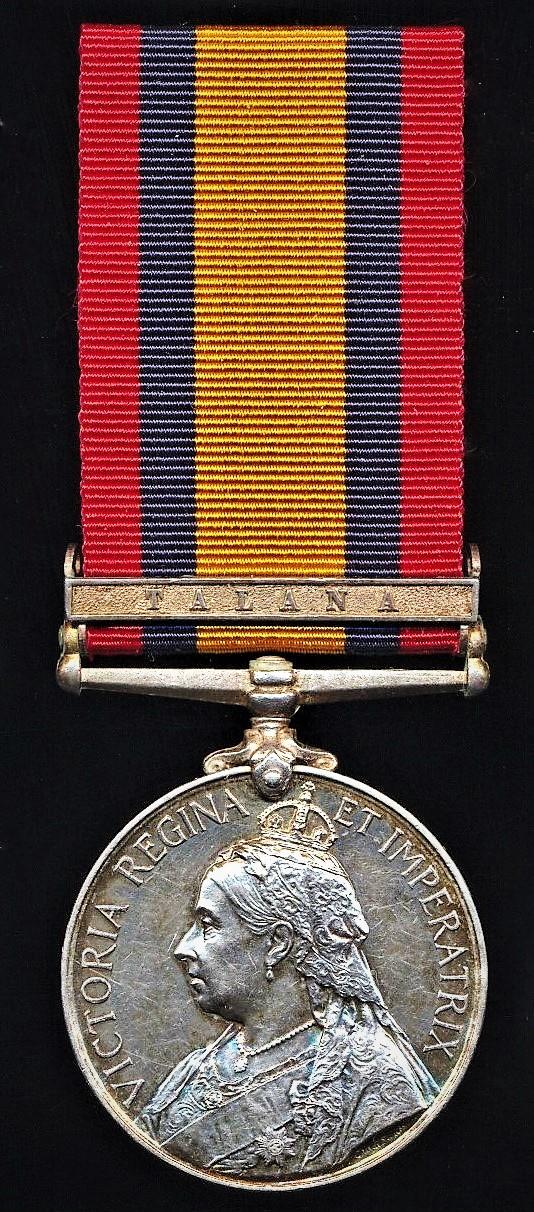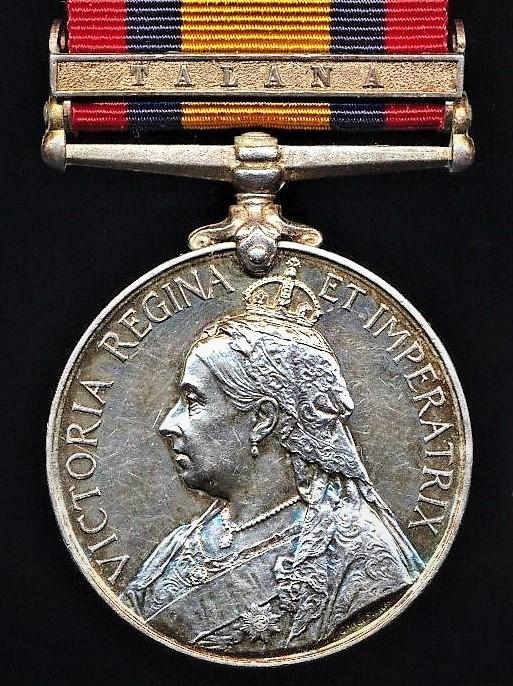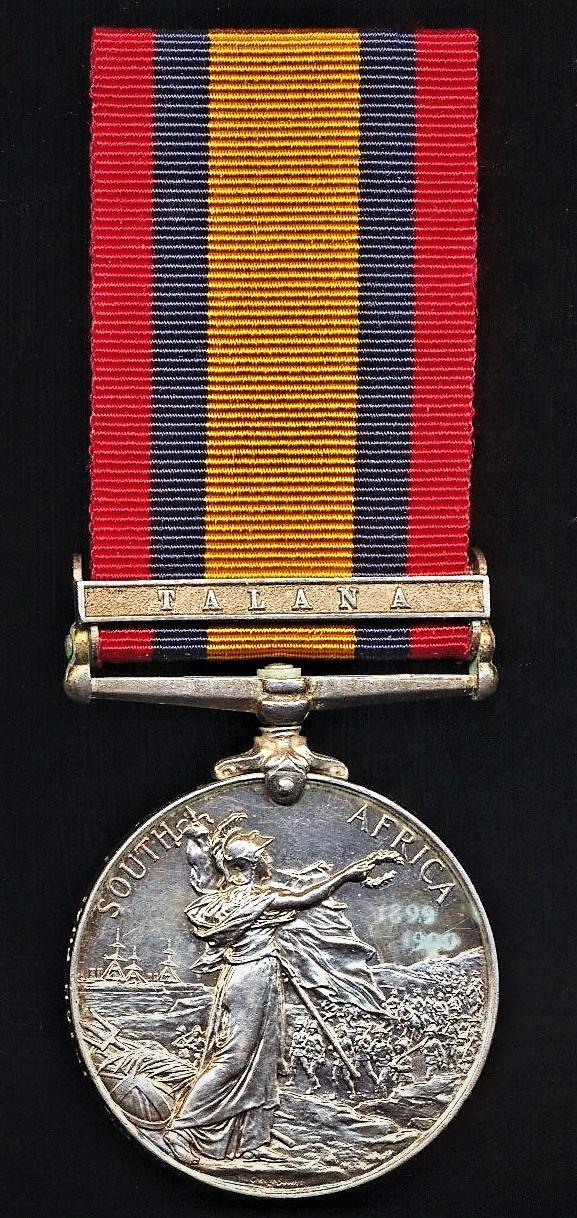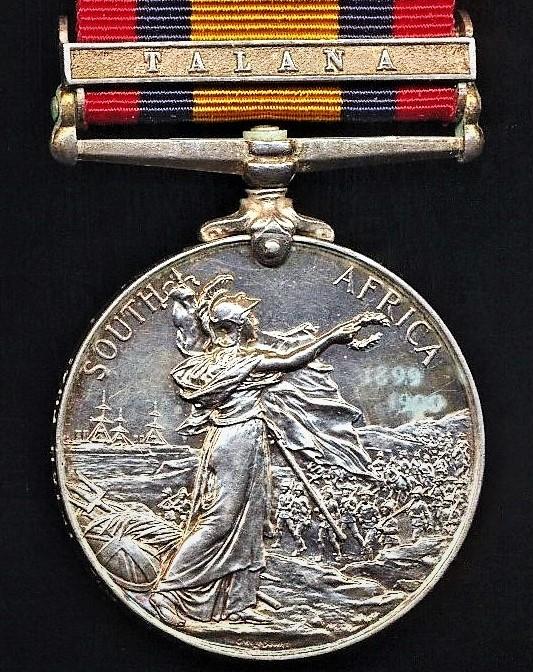Queens South Africa Medal. Silver issue & clasp 'Talana' (5926 Pte J. Cunningham, Rl. Irish Fus:)
Wounded-in-Action: Private James Cunningham, 1st Battalion Royal Irish Fusiliers, confirmed 'Wounded-in-Action', at, Farquhars Farm, South Africa, on, 30 October 1899 - and an early 'British', South African War battle casualty
The wounds suffered by James Cunningham were of such debilitating severity (GSW to 'Right Thigh & Femur Fractured), that his right leg was shortened by 1.5 inches (service papers refer)
On, 30 October 1900, as the ammunition of the men of the 1st Battalion started to run out, the order ran out;
Quote,
'Faugh-a-Ballaghs, fix your bayonets and die like men'.
Unquote.
Battle of Farquhars Farm (also confusingly (and typical for the South African War) referred to as the Battle of Ladysmith, & Nicholson's Nek) was fought on 30 October 1899. Less confusing is that the battle on this date was the first comprehensive 'Boer Victory' and, corresponding British defeat of the South African War. The battle was fought between the main Boer army, under Joubert, and British troops drawn form the garrison of Ladysmith, under Sir George White. The Boer position covered about eight miles, and White attacked in three columns, one of which - including 1st Battalion Royal Irish Fusiliers - detached to the left to hold a position at Nicholson's Nek, was overwhelmed and surrendered. The Boers meanwhile developed a strong attack against the British right, and White, having no guns capable of coping with the heavy Boer ordnance, ordered a retreat. This was effected in good order, and was greatly aided by the opportune arrival of two heavy naval guns, under Captain Hedworth Lambton. In the fighting of 30 October 1899, The British lost 317 killed and wounded, and a staggering1,068 missing (captured). Boer losses were by comparison, negligible..
Medal and clasp verification: Medal and clasp confirmed as entitled on the respective campaign medal roll of the 1st Battalion Royal Irish Fusiliers (ref WO 100/205) that was compiled and signed 'In-the-Field', Springfontien Orange River Colony, South Africa, on, 30 July 1901. The roll with entry under remarks column, 'Invalided England
The recipient James Cunningham, an Ulsterman, was the son of John Cunningham, and a native of, Newry, County Down, Ireland, where he was born circa 1878. By trade a 'Miner', James claimed to be 19 years & 7 months of age, when he enlisted in the British Army, at. Glasgow, Scotland, on, 9 March 1897. Posted to the Royal Irish Fusiliers, James joined the Regimental Depot of the regiment at Armagh, on, 17 March 1897, and then was transferred to, 2nd Battalion Royal Irish Fusiliers, on, 26 March 1897. He was transferred to 1st Battalion Royal Irish Fusiliers on, 11 February 1899. James served overseas in Egypt, between, 14 February to 23 September 1899. James together with his battalion, were amongst the first British infantry regiments to be rushed to South Africa after the outbreak of the South African War. James served on active service in South Africa, 24 September 1899 to 22 April 1900, during which he was 'Wounded-in Action' at Farquhars Farm on, 30 October 1899. James took his final discharge from the British Army, on, 5 July 1900, due to being found to be medically unfit for further service. At time of discharge, his military conduct was described as having been 'Good'. He had served 3 years 119 days 'With the Colours'
Service papers for the recipient are extant and are held & accessible at The National Archives
A scarce single 'Battle Clasp' QSA
Condition: Hairlines GVF
Code: 22001







